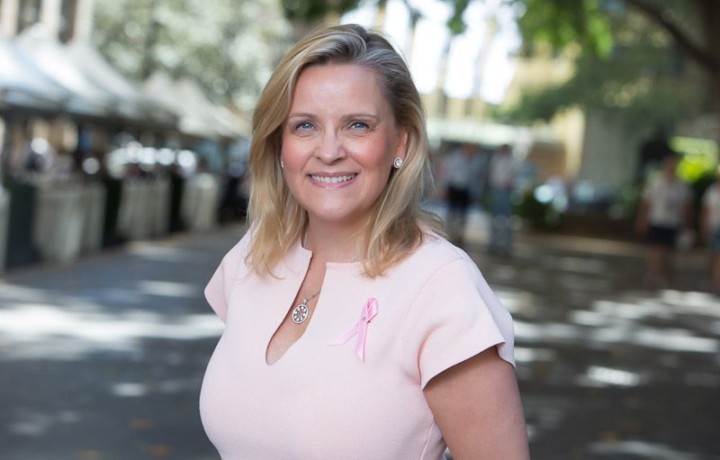WE’RE FOR A FUTURE WITHOUT FEAR OF BREAST CANCER
To coincide with Breast Cancer Awareness Month, the National Breast Cancer Foundation (NBCF) has released new data showing 30,000 more lives could be lost to breast cancer by 2030, without adequate research investment.
NBCF has funded vital life-saving research into breast cancer since 1994, and the data shows that with this funding from the generous Australian community, over 44, 000 lives have been saved in this time. This has been achieved through identifying new risk factors, improving early detection and creating more effective, less harsh treatment options.
Professor Sarah Hosking, CEO of the National Breast Cancer Foundation, believes that continued investment in life-saving research is the only way to stop deaths from breast cancer.
“This year alone nearly 20,000 Australians, both men and women, will come face to face with the disease and unfortunately more than 3,000 will lose their life*. This doesn’t have to be the case though; the National Breast Cancer Foundation has launched an ambitious target of Zero Deaths from breast cancer but it is up to all Australians to help us achieve it,” she said.
“Our target is possible but only if we continue to receive direct investment for the world-class research we fund. We are at a critical juncture whereby a future where no Australian has to lose a parent, partner, sibling or child to this devastating disease is in sight. By investing in NBCF’s vision of zero deaths from breast cancer, you can support our game-changing research projects and help us achieve the target,” she added.
“NBCF has launched an ambitious target of Zero Deaths from breast cancer but it is up to all Australians to help us achieve it.”
Professor Sarah Hosking,
CEO, National Breast
Cancer Foundation

BREAST CANCER IN AUSTRALIA: WHAT WE'RE UP AGAINST
Breast cancer is the most commonly diagnosed cancer in Australia. Its incidence is rapidly rising, with breast cancer diagnosis rates almost doubling since 1994. 1 in 7 women will be diagnosed with breast cancer in their lifetime, and 53 Australians are diagnosed with the disease each day*. On average it costs Australia over $800 million per year in medical expenses to manage it.**
This October, which is Breast Cancer Awareness Month, the National Breast Cancer Foundation is putting a spotlight on how the Australian community can save the 8 women who die from the disease each and every day, so that no-one has to lose a loved one to breast cancer.
NBCF will continue to invest in cutting-edge research projects to achieve Zero Deaths from breast cancer. We will do this by analysing large datasets across the country to identify trends and factors contributing to lower survival. We will also be funding a significant amount of research into the most aggressive breast cancer subtypes so that we can improve detection and treatment, particularly in metastatic and triple-negative breast cancers. In addition, we will conduct research to enable better health service delivery and services across Australia so that breast cancer survival is something accessible to all.
*Breast cancer in Australia statistics | Breast cancer. (2018). Retrieved 25 September 2019, from https://breast-cancer.canceraustralia.gov.au/statistics
** Goldsbury et al., 2018, PLOS ONE
MEET TRACEY
Tracey was diagnosed with breast cancer in 2010 at the age of 47. She had multiple surgeries, including a double mastectomy, and chemotherapy to treat the cancer. Years later, she found out it had spread to her spine, ribs, liver and right lung.
Tracey refuses to let her diagnosis get in the way of her making the most out of her life. To date, she has climbed Sydney Harbour Bridge, spent Christmas and New Year’s Eve in Northern Ireland with family, swam with dolphins, saw her daughter get married and was also there for the birth of her grandsons.
She cherishes every moment with her family and has been a pillar of support for her son Leigh, who was born with a chronic bowel disease.
Leigh said of her prognosis in a letter to his mum: “Finding out you were terminal hit me like a ton of bricks, just knowing that you will never be free of cancer made me feel helpless. You always put on a brave face and tried to smile through the hard moments in the following months. I don’t know how you did it.”
Tracey hopes that with continued breast cancer research there will be more treatment options for those diagnosed with advanced breast cancer. With more investment in research, she has faith NBCF will reach their goal of Zero Deaths from breast cancer.
“Research holds the only chance for a cure and that cure gives me and other women like me with advanced breast cancer hope and time. Time to see our children grow up, time to live our lives, time to love,” said Tracey.
